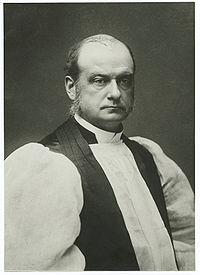Dr. Henry C. Potter, who gave Lawrence’s funeral sermon, was rector of Grace Church and seventh bishop of the Episcopal Diocese of New York.

In Wikipedia we read:
He was notable for his interest in social reform and in politics: as rector of Grace Church he worked to make it an institutional church with working-men’s clubs, day nurseries, kindergartens, etc., and he took part in the summer work of the missions on the east side in New York City long after he was bishop; in 1900 he attacked the Tammany Hall mayor (Robert A Van Wyck) of New York City, accusing the city government of protecting vice, and was a leader in the reform movement which elected Seth Low mayor in the same year; he frequently assisted in settling labour disputes.
Potter therefore could be seen as a proponent of the Social Gospel. Michael Bourgeois in All Things Human: Harry Codman Potter and the Social Gospel in the Episcopal Church, points out that Potter was entirely evangelical and orthodox, but emphasized that Jesus had come to end both sin and suffering. Suffering was in part caused by unjust social structures.
Potter, as his sermon on Lawrence indicated, was concerned about the masculinity of the clergy. The proponents of the Social Gospel thought that Christianity had become sentimentalized and therefore feminized. Walter Rauschenbusch, at the beginning of the twentieth century, claimed the failure to preach the Social Gospel was the reason “that our churches are overwhelmingly feminine.”[i] The Southern Baptist Convention in 1915 proclaimed: “Some think of the Kingdom of God as narrow, effeminate and sentimental. The exact opposite is true. It is broad, masculine, and practical….So long as there is social inequality, industrial justice or political crime, the kingdom of God is not yet fully come….The kingdom of God is not a Sunday affair. It must pervade the factory that runs six days a week as well as the Sunday morning service.” Religion was a public matter for men who would fight for justice, as the Evangelical Wilberforce had by his persistence ended the slave trade.
Potter was aware that individual vices also brought suffering. Drunkenness led to violence and neglect of family. But instead of becoming a Prohibitionist, attacking the male vice of drinking. Potter thought working men should be able to drink in a decent environment. He therefore founded the Subway Tavern.

The Subway Tavern was to operate like a respectable upper-class club, except for poorer folks. “I belong to many clubs which I can go,” remarked the bishop, “but where can the toiler go?” Where, indeed!
Potter honestly believed the Subway Tavern could be jovial and free-spirited without becoming debaucherous. The front room, adored with a sign ‘To The Water Wagon’ playfully overhead, would be open to both sexes “with a ‘sanitary’ soda water fountain where beer will be served to women.” Men would have a private room behind some swinging saloon doors in the back.
As the bar was funded by donations, the ‘evils’ of profit were eliminated. And thus, reasoned Potter, bartenders would not encourage patrons to drink. Men and women could come to converse, read a newspaper and have one — maybe two — drinks. Employees were to closely watch the intoxication levels of customers; if one even looked tipsy — if say, somebody appeared to be enjoying their drink a wee too much — they would be cut off. Healthy food would also be on hand downstairs to soak up any amoral toxins in the belly.
As the New York Times lightly mocked, “The benevolent bartenders … are anguished when they are compelled to serve whisky, and … dimple with joy when sarsaparilla pop is ordered.”
It was a great idea but, alas, did not work out.
[i] Walter Rauschenbusch, Christianity and the Social Crisis (Louisville, KY: Westminster/John Knox, 1991), 367.